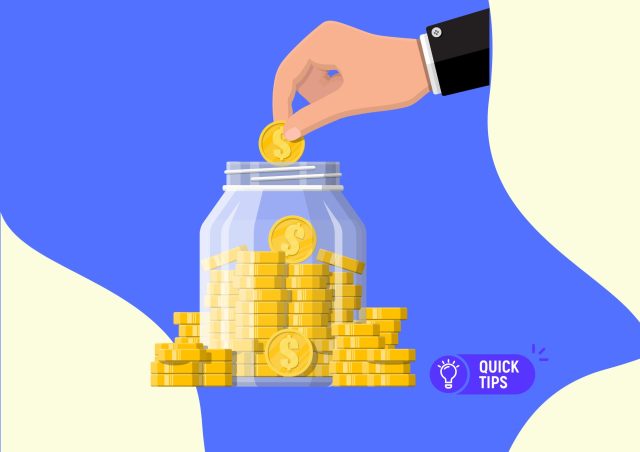6 Money Tips to Face Inflation Head-On
By Dumb Little Man
January 10, 2024

Inflation is the general increase in the price of goods and services over time. This can erode the value of your investments as money's purchasing power decreases over time. By investing in assets known to hedge against inflation, you can help safeguard your investments from its damaging effects.
With the rising cost of goods and services, it is essential to take proactive steps to protect your savings and investments against inflation. In this article, we'll look at some effective money tips against inflation and provide practical examples of how to implement them.
6 Money Tips to Survive Inflation

Investing in stocks and real estate
Stocks and real estate have long been seen as reliable hedges against inflation. As living costs rise, the value of both assets may increase as well, providing potential protection from increases. Specifically, investing in stocks that pay dividends provides a steady source of income which may increase over time. Likewise, investing in real estate – either directly or through a Real Estate Investment Trust (REIT) – offers both rental income and potential capital appreciation potential.
Invest in Treasury Inflation-Protected Securities (TIPS)
Treasury Inflation-Protected Securities, or TIPS, are bonds issued by the US government that are an index to inflation. As such, their principal value adjusts upward with inflation over time, protecting investors against rising prices. Furthermore, TIPS pay interest twice annually at a fixed rate, also adjusted up with inflation adjustments.
For example, if an investor purchases a $10,000 TIPS bond with a fixed rate of 2% and inflation is at 3%, the principal value will rise to $10,300, and the interest payment will increase from $200 to $206.
Investing in commodities
Commodities such as gold, silver, and oil can be an excellent hedge against inflation. This is because as the cost of goods and services increase, so too do commodity prices typically rise as stores of wealth become more valuable. However, it's important to remember that commodity prices may vary significantly and not always correspond with inflation rates.
Diversify Your Investments
Diversifying your investments across different asset classes can help protect against inflation eroding your purchasing power. A diversified portfolio might consist of stocks, bonds, real estate, commodities, and alternative investments like private equity or hedge funds. By spreading out your investments across various asset classes, you reduce the impact of inflation on any one particular investment.
Maintain a Healthy Emergency Fund
Ample emergency funds can protect against unexpected expenses and minimize the need to sell investments at an inopportune moment. With inflation diminishing cash value over time, it's essential that your emergency fund keeps up. For instance, if your monthly expenses total $3,000 and you want to have at least $18,000 in cash or cash equivalents on hand at all times, make sure your emergency fund keeps pace with rising prices.
Monitor Your Expenses
Tracking your expenses can help you identify areas for cost reduction and savings. By saving cash, it frees up funds to invest in assets that may provide protection from inflation. For instance, cutting back on discretionary purchases like dining out or entertainment and redirecting those funds towards investments could provide a hedge against inflation.
Takeaway
In conclusion, protecting your savings and investments against inflation is an integral part of achieving long-term financial security. By adhering to these money tips against inflation and incorporating them into your overall financial plan, you can help safeguard your purchasing power while building a more resilient portfolio.
FAQs
What is inflation protection?
Investments that offer a safeguard against the increase in the prices of goods and services over time are known as inflation-protected. A portfolio that is inflation-protected consists of assets that demonstrate strong performance during periods of elevated inflation.
Who benefits from inflation?
Those with fixed-rate, low-interest mortgages and certain stock investors experience advantages from inflation, while individuals and families relying on a fixed income and holding debt with variable interest rates are the ones who suffer the most due to inflation.
Why should we control inflation?
The saying “too much of anything is never good” accurately portrays the importance of managing inflation. Severe inflation in a country results in high-interest rates, making it difficult for individuals to undertake expensive economic projects and ultimately causing a widespread impact of inflation on the populace.
How do the rich get richer during inflation?
Monetary inflation primarily elevates asset prices, but it has a limited impact on increasing wages. As a result, those who possess more assets experience a rise in their net worth, whereas those who rely on wages fall farther behind.
Which sectors do well in inflation?
Historically, companies operating in the energy and materials sectors have demonstrated a positive correlation with inflation. This indicates that their asset values and product prices generally increase as inflation rises.
Dumb Little Man
At Dumb Little Man, we strive to provide quality content with accuracy for our readers. We bring you the most up-to-date news and our articles are fact-checked before publishing.







